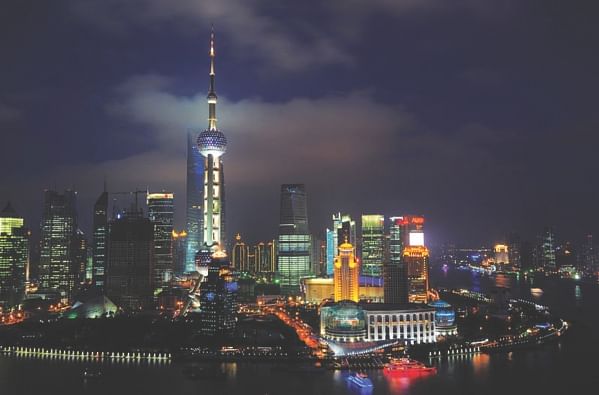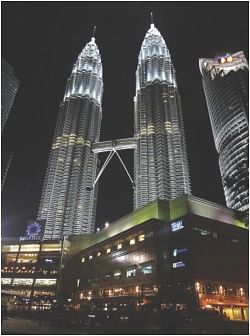| Home - Back Issues - The Team - Contact Us |
 |
| Volume 11 |Issue 39| October 05, 2012 | |
|
|
International
Emerging Asia Krishnan Srinivasan Simultaneously underestimated and overestimated, the European Union of 27 nations is nevertheless one of the most energetic actors internationally, with strategic and security intentions and aspirations. There are many studies in Europe on the European Union's foreign policy towards Asia, most of them hugely unrealistic and utopian, and very few studies in India or English-speaking Asia, on the same subject. This is probably because Europe is perceived by most of the Asian public as being a region in significant decline, and perhaps heading towards museum or theme-park status as a fondly familiar continent of country estates and quaint unoccupied churches, to visit on a holiday. But Europe still takes itself very seriously, though its self- image and the view of it from outside may not be in total harmony. The European believes in freedom over discipline, individual rights over corporate rights, the quality of life over hard work, the individual over the family, media freedom over restraint, the right to blaspheme over pious orthodoxy, ration over religion, that the expansion of democracy in whatever form can only be good for any society, and that European social and governance patterns are valid for all time in all places. All this sets it at odds with current Asian values. A certain European Union foreign minister in 2009, and still in the same job, warned the Sri Lankan government in 2009 that if it did not immediately issue visas for a team of European investigators he would see to it that there were severe reprisals from the Union. The Sri Lankans did not budge and the bluff was called. But the arrogance and the threat were disturbing, being an example of the presumption of moral superiority that unavoidably sparks the question whether European crypto-colonialism is still present when it comes to dealing with Asians. As Kishore Mahbubani, a leading intellectual from Singapore wrote recently; “As the world becomes smaller, denser, more interconnected and complex, the biggest danger the world faces is western group-think, when the era of western dominance is gone.” Talk of an "Asian Century" may be wishful-thinking moonshine, but we are edging towards a more pluralistic, non-European, non-Western world. For the first time since the Industrial Revolution, the Asian emerging economies are gaining in confidence and will stand up. Possibly Asian capitalism will become a more dangerous competitor to the West than international communism ever was.
The more dynamic countries of Asia have retaken control of vast resources, huge assets, big markets, are generating surplus capital, and are less dependent on imported innovation, capital inflows, development aid and technology. They are making a significant contribution to the world economy. The rise of the Asian middle class with its purchasing power is expected to climb in number to 1.75 billion by 2020. The Brazil-Russia-India-China-South Africa group of countries pledged US$75 billion (of which, $43 billion from China) in June this year to the IMF to be used as bailout money for the Eurozone. The emerging Asian economies are still reticent in international financial and economic forums, but at some time in the future, it may be possible to integrate the world economically under their leadership. The West's economic problems are chronic and they are looking to strengthen their growth prospects on the backs of each other's economies. It will be possible for a languishing Europe to tap into the opportunities for global growth that the Asian economies represent, but only if it does not resent a shift in power that does not involve Europe, and which does not share its value system. It will not be possible for the Europeans to access Asian money, markets and investment, and still try to maintain political dominance. The West will have to trade-off the benefit of raising its levels of prosperity against the loss in its global importance. Therefore, the question arises whether the European Union's engagement with Asia will be purely transactional or meaningfully strategic. The economic slowdown suggests that a more inward looking USA is highly possible--which leads to the subject of the Union being intimately identified with the United States in its foreign policy choices. Can it provide an alternative to the American leadership of the West when it comes to Asia, and does it even have the inclination to try? If there is a conflict in Asia, say between China and the USA, will Europe automatically support the USA? And if there is a conflict between two Asian countries, such as India and China, or China and Japan, where will the EU stand? Can the European Union have a common foreign policy when it does not participate as one entity in the United Nations or compete as a single unit in the Olympic Games? What is its international personality, and can it even possess one when it eschews the capacity to deploy force to back it up? Does Europe have any ideas for bridging the gap that exists between the different cultural patterns? It will be necessary to abandon old stereotypical images of Asia in Europe--and vice versa, of course. These traditions come from different historical experiences and the imprint of imperialism. A global multicultural system cannot be an exclusive preserve of western standard-setting. A free trade agreement, discussed for years between India and the European Union, is held up because of Europe's insistence on clauses pertaining to labour laws, environment protection and human rights, which may all be legitimate concerns when proposed as a part of negotiating give-and-take, but not when they are posed as non-negotiable demands. The Union officials are believed to find the bureaucratic maze difficult to navigate when it comes to dealing with India, which would be a joke to anyone who had to deal with the intricate web of indecision that lies in the European Commission, which is the European Union's secretariat in Brussels. Europeans lay a claim to soft power, but that is something the Asians associate with individual European states, and not with Europe as a whole or the European Union as such. Nor is the Union a 'smart' power, which combines soft and hard power. As far as the much-vaunted normative power is concerned, “our size fits all” does not cohere well with Koran burning, 100,000 civilian deaths in Iraq and an untold number in Libya and Afghanistan. Those military interventions and their dire consequences cannot be the underpinning of any values-based authority. There is a demand from China, India and Indonesia for more power-sharing in forums like the UN Security Council, the IMF and World Bank. India has already staked a claim to UNSC permanent membership, and it will not be long before there is a candidate from emerging Asia for the directorship of the IMF and IBRD. When about two-thirds of the world's foreign exchange reserves repose in Asia, decision-making in the global financial institutions still continues to be vested in the recession-torn West, which is a historical anomaly that needs to be corrected. Europe should have the grace to bow out of the entrenched positions that it has held since the Second World War before it is openly challenged by Asia. The writer is India's former Foreign Secretary. |
||||
Copyright
(R) thedailystar.net 2012 |

